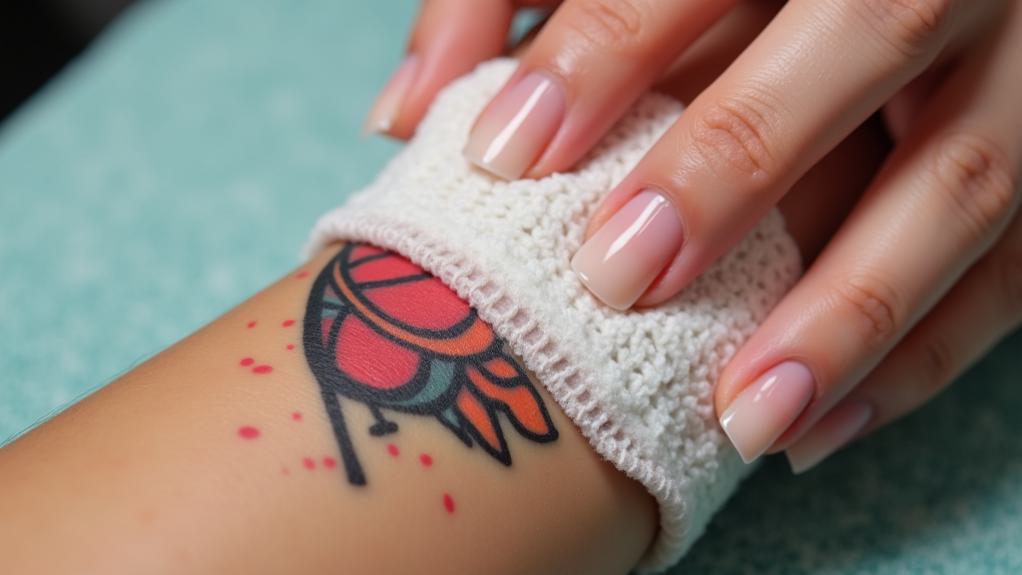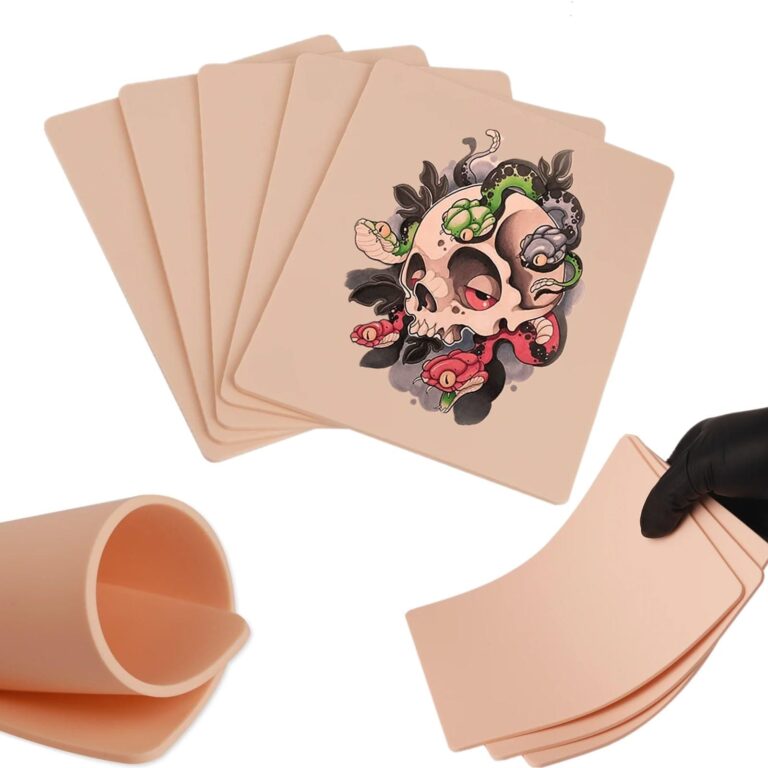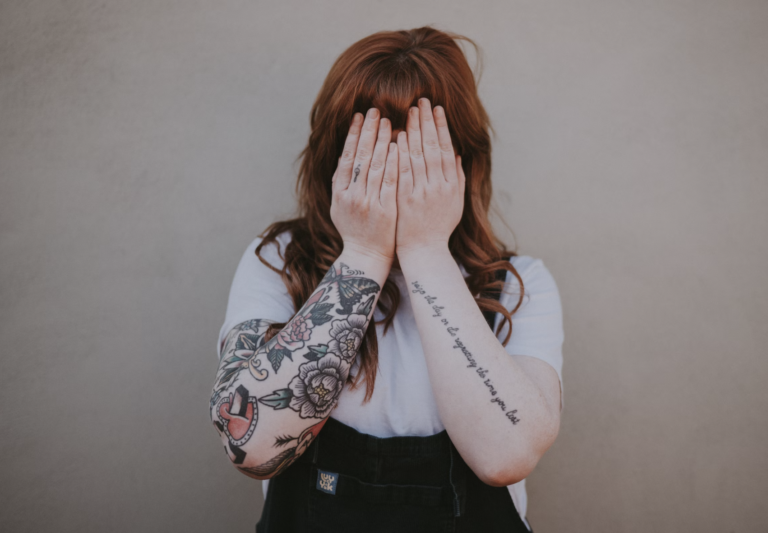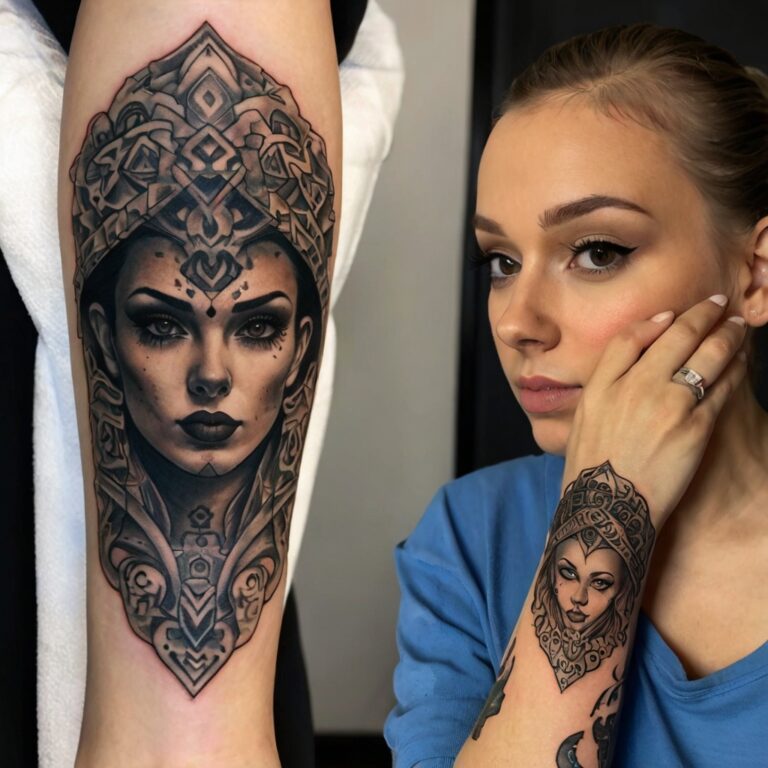Tattoo itchiness refers to the uncomfortable sensation experienced on or around a tattooed area, which can occur during the healing process or due to other factors. If you've noticed your tattoo becoming itchy, it's a common experience and not just a figment of your imagination.
The main reasons for this irritation range from the natural healing process of the skin to possible allergic reactions to the ink used in the tattoo.
In this post, we will explore the common causes of tattoo itchiness and provide some simple relief tips. Understanding these factors is crucial for effectively addressing the discomfort while ensuring your tattoo remains vibrant and healthy.
Let's delve into what might be triggering your tattoo's irritation and discover ways to soothe that itch.
Common Causes of Itchy Tattoos
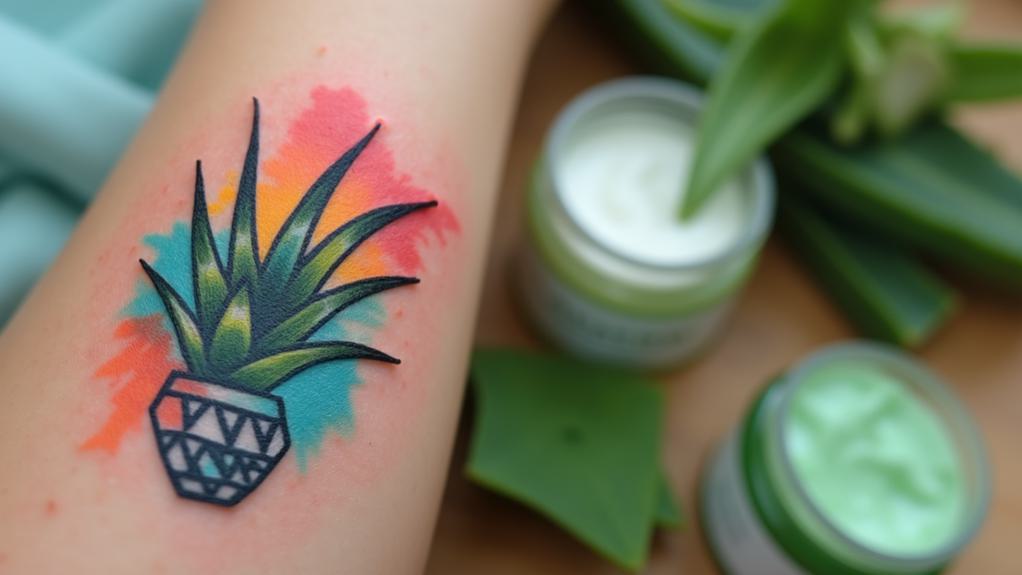
Itchy tattoos may result from several factors. Healing skin after the tattooing process can lead to irritation, as the needles create tiny wounds that your body works to repair.
Dryness is another common cause; if you don't moisturize your tattoo properly, it may become dry and itchy. Additionally, using harsh soaps or lotions with fragrances or alcohol may irritate the skin and contribute to itchiness.
Allergic reactions to tattoo ink may also cause inflammation and itchiness, as some pigments may trigger allergies.
Lastly, environmental factors like heat and sweat may exacerbate itchiness, particularly in hot, humid conditions. Understanding these causes may help you better manage any discomfort associated with your new tattoo.
Understanding the Healing Process
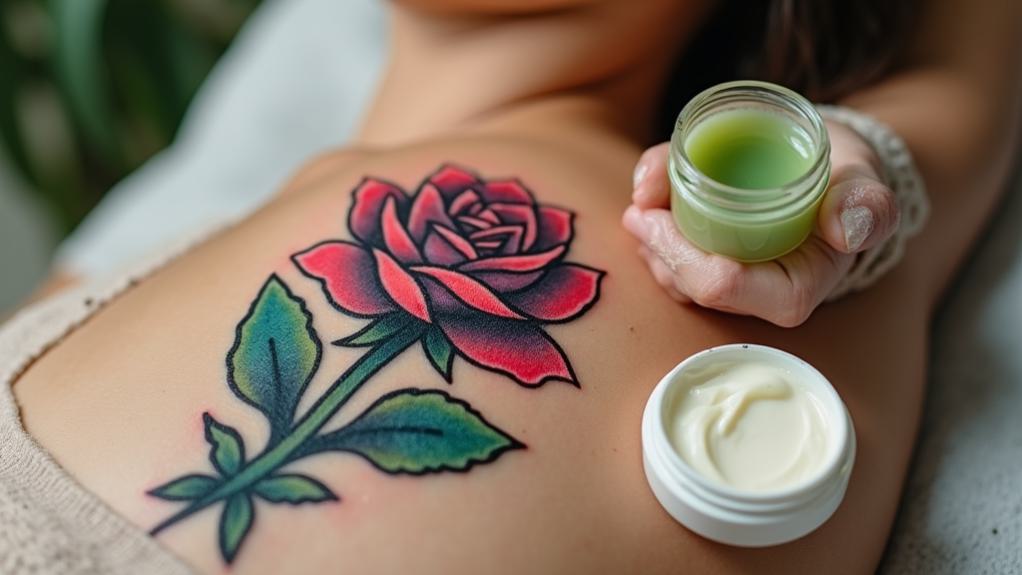
Steering the healing process of a tattoo involves understanding the stages your skin goes through after the ink is applied. Initially, your skin may be red, swollen, and tender due to the trauma of the needles. It's crucial to keep the area clean and moisturized to prevent scabbing.
As healing progresses, the tattoo may begin to itch, indicating that your skin is repairing itself. While it may be tempting to scratch, doing so may lead to complications like scarring or fading of the ink. Instead, gently pat the area or apply a fragrance-free lotion to soothe the itchiness.
Around two to three weeks in, the outer layer of skin may start to peel. It's important to let the flakes fall off naturally.
After about four to six weeks, your tattoo may be fully healed, although deeper layers may continue to settle for a few months. During this time, maintaining proper hydration and sun protection may help keep your tattoo looking vibrant.
Allergic Reactions to Ink
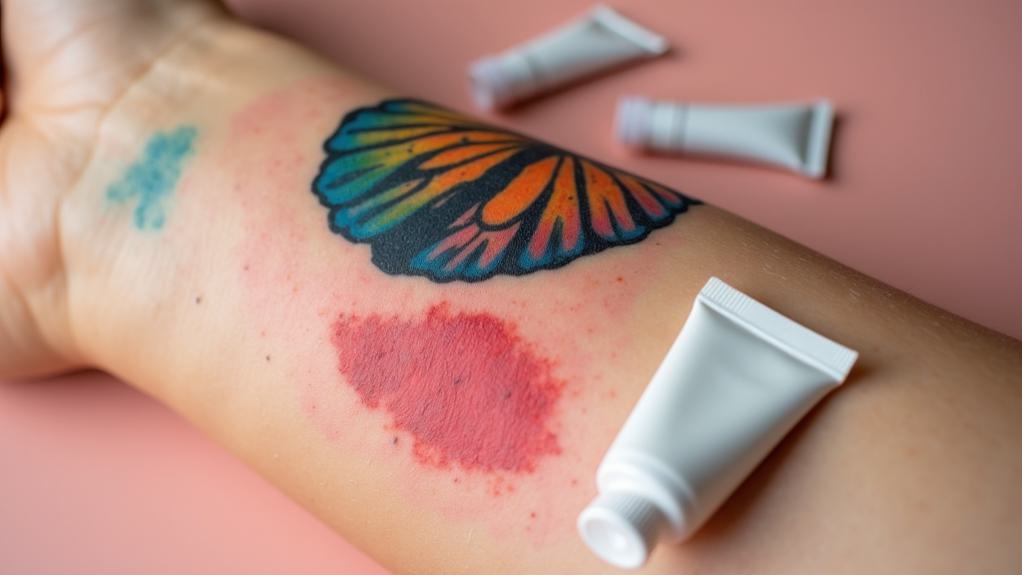
Excessive itching, unusual redness, swelling, or bumps around your tattoo may indicate an allergic reaction to the ink. Some individuals may be sensitive to specific pigments, especially red, yellow, and green.
Allergic reactions can occur days to weeks after getting a tattoo, and may even manifest years later. Symptoms may include inflammation, rash, intensified itching, and warmth around the tattooed area.
If you experience these symptoms, it's essential to consult a dermatologist or your tattoo artist. They may help determine if the ink is the cause and suggest treatments such as topical steroids or antihistamines.
In persistent cases, laser removal may be necessary. Your comfort and health are paramount, so seek help if something feels off.
Skin Sensitivity and Irritation
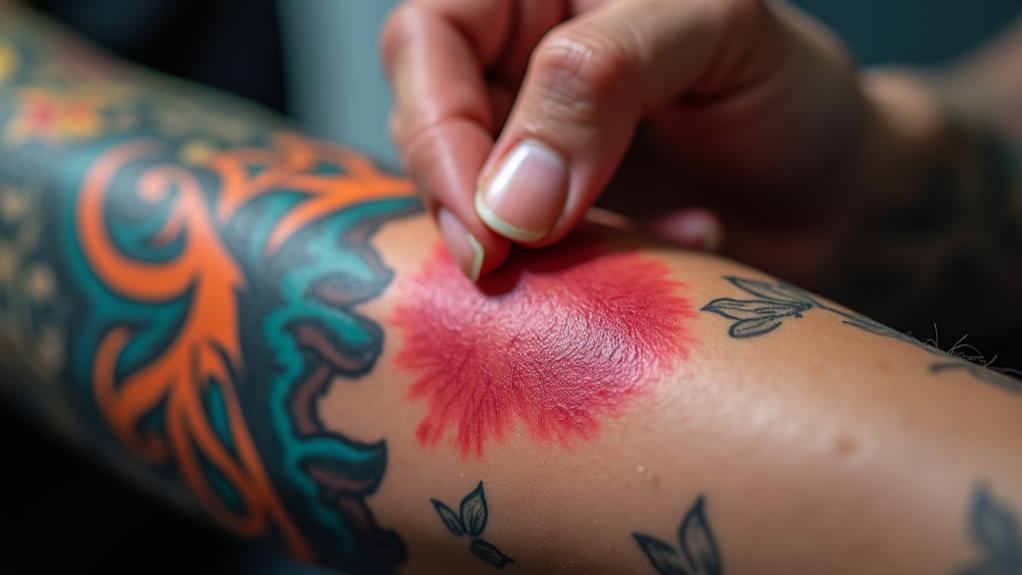
If your tattoo is itching, it might be due to common irritants in your environment or products you're using.
Your skin type also plays an essential role in how it reacts to the tattooing process and aftercare.
Understanding these factors can help you manage and reduce irritation effectively.
Common Irritants Explained
Tattoos may trigger skin sensitivity and irritation due to common irritants in your environment. Products like lotions, soaps, and detergents may contain fragrances and chemicals that provoke itchy reactions.
Applying new products near your tattoo may result in negative skin reactions, especially if your skin is sensitive. Natural ingredients, such as essential oils, may also cause irritation for some individuals.
Sweat and heat may exacerbate itchiness, particularly during warmer months or after exercise. Tight or rough fabrics can lead to friction, resulting in irritation.
It's important to choose breathable, soft materials to allow your tattoo to heal properly.
Allergies to tattoo ink may occur, particularly with colored inks. If you experience persistent itching and redness, consulting a dermatologist may be advisable.
Identifying and avoiding these irritants may improve your comfort and the longevity of your tattoo. Monitor your skin's response and adjust your routine as needed to maintain the beauty of your artwork.
Skin Type Considerations
Your skin type may significantly affect how your tattoo heals. Sensitive skin may experience increased itching and irritation during the healing process.
Oily or combination skin may allow tattoos to heal faster due to natural oils, but it can also lead to clogged pores and irritation.
Dry skin may exacerbate itching, making it crucial to keep the tattooed area moisturized.
Regardless of your skin type, it's important to monitor how your skin reacts to various products. Always test new lotions or ointments on a small area first.
Consulting with your tattoo artist about suitable aftercare for your specific skin type may help minimize irritation and promote healing.
Understanding your skin type may ultimately assist you in managing itching and ensuring a smoother healing experience.
Tips for Relief and Comfort
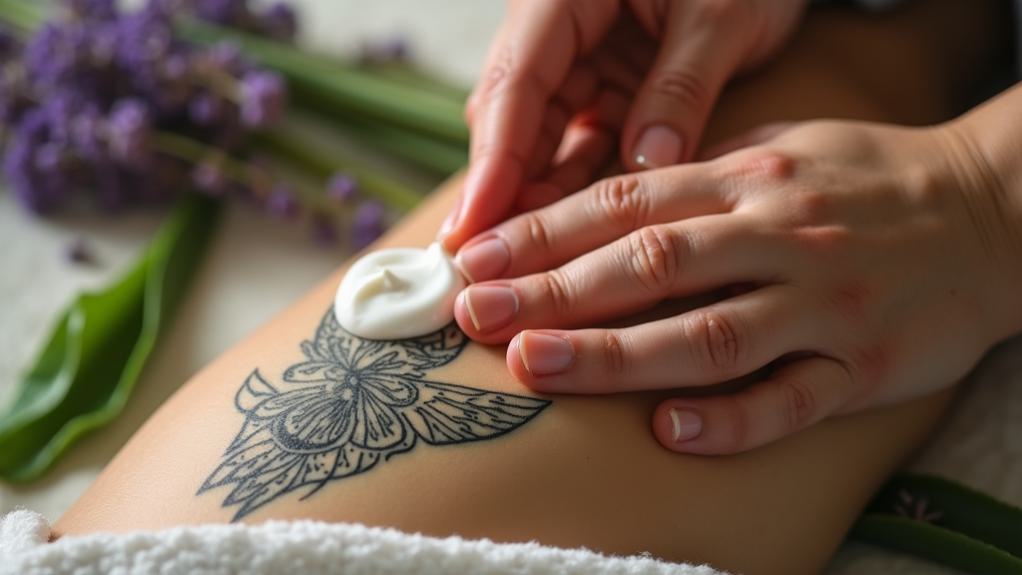
To ease that itchy feeling, make sure you moisturize your tattoo regularly; this helps keep your skin hydrated and reduces irritation.
You should also avoid wearing irritating fabrics that can aggravate the area.
Moisturize Regularly
Moisturizing regularly may greatly alleviate the itchiness associated with healing tattoos. Keeping your skin hydrated may help maintain its elasticity and reduce the urge to scratch.
Choose a fragrance-free moisturizer specifically designed for sensitive skin, as harsh scents and chemicals may further irritate your tattoo.
Apply the moisturizer gently using clean hands to avoid introducing bacteria. It's best to do this at least twice a day or whenever you notice dryness.
After washing your tattoo with mild soap, pat the area dry with a clean towel and follow up with your chosen moisturizer. This routine may soothe the skin and support the healing process.
Be mindful of how much product you use. A little may go a long way—too much moisturizer may clog pores, leading to other skin issues.
If you're experiencing excessive itchiness or irritation, it may be wise to consult your tattoo artist or a dermatologist.
Remember, keeping your tattoo well-moisturized may be essential, especially in the first few weeks after getting inked, as this is when itchiness tends to peak.
Stay consistent, and your skin may thank you!
Avoid Irritating Fabrics
Choosing soft, breathable fabrics like cotton or bamboo may help minimize irritation and discomfort during the healing process of your tattoo. Avoid rough materials such as wool or heavy denim, as they may exacerbate itchiness.
Loose-fitting clothing is advisable, as tight garments may rub against your tattoo and increase irritation.
When selecting fabrics, test them on a small area of skin to ensure they won't cause discomfort. Additionally, using gentle, hypoallergenic detergents may keep your clothing skin-friendly, while avoiding fabric softeners and harsh detergents may further reduce the risk of irritation.
Be mindful of seams and tags, as they may cause scratching and discomfort.
When to Seek Professional Help
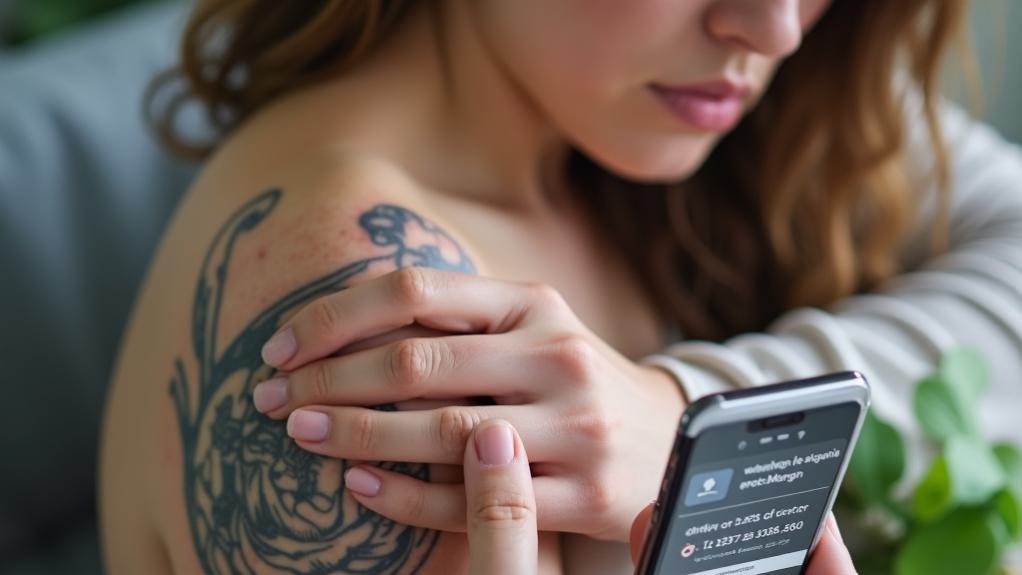
If your tattoo's itchiness persists beyond the healing period or becomes more severe, you should seek professional help. Persistent irritation may indicate an underlying issue that requires attention.
Signs that may prompt you to consult a professional include:
- Severe swelling or redness: Significant inflammation may signal an infection or allergic reaction.
- Pus or discharge: Unusual discharge may indicate an infection and should be evaluated by a healthcare provider.
- Changes in color or texture: Unexpected changes in your tattoo's appearance, such as blistering or peeling that doesn't improve, may warrant a check-up.
Ignoring these symptoms may lead to complications or prolonged discomfort. A professional can assess your situation, provide an accurate diagnosis, and recommend appropriate treatment options.
Your health and comfort are essential, so don't hesitate to reach out for help if something feels off.
Frequently Asked Questions
Can Weather Conditions Affect Tattoo Itchiness?
Yes, weather conditions may affect tattoo itchiness.
When temperatures rise or humidity increases, your skin may become more prone to irritation, leading to that annoying itch.
Conversely, cold and dry weather may strip moisture from your skin, causing it to feel tight and itchy.
To manage this, you may want to keep your tattoo moisturized and protect it from extreme weather.
Always pay attention to how your skin reacts to different conditions.
How Long Does Tattoo Itching Typically Last?
Tattoo itching typically lasts anywhere from a few days to a couple of weeks.
During the healing process, your skin may feel irritated as it regenerates. If you've just gotten your tattoo, you may expect some itching for about two weeks, but this can vary depending on your skin type and aftercare.
Are Certain Tattoo Colors More Likely to Cause Itching?
Certain tattoo colors may be more likely to cause itching.
Darker inks, like black and blue, may contain more pigments that could irritate your skin.
Conversely, some lighter colors, especially those with white or yellow pigments, may also cause reactions due to their chemical composition.
If you notice excessive itching after getting a tattoo, it may be a good idea to consult a professional to ensure you're not experiencing an allergic reaction.
Can Diet Impact Tattoo Healing and Itchiness?
Yes, your diet may impact tattoo healing and itchiness. Eating a balanced diet rich in vitamins and minerals may support your skin's health, helping it heal properly.
Foods high in omega-3 fatty acids, like fish and walnuts, may reduce inflammation, while staying hydrated may keep your skin moisturized.
On the other hand, processed foods and excessive sugar may hinder healing and cause irritation.
Is It Safe to Apply Lotion on an Itchy Tattoo?
It's generally safe to apply lotion on an itchy tattoo, but you should choose the right type.
Look for a fragrance-free, gentle moisturizer that may not irritate your skin. Applying lotion may help soothe discomfort and keep the tattoo hydrated, which may promote better healing.
Just be cautious not to overdo it—too much lotion may lead to clogged pores.
Always check your tattoo's healing progress and consult a professional if you're unsure.
Conclusion
To sum up, itchy tattoos can be frustrating, but understanding the causes helps you find relief. Whether it's the healing process, an allergic reaction, or skin sensitivity, you can take steps to soothe the itch. Remember to moisturize, wear breathable fabrics, and resist the urge to scratch. If the itching persists or worsens, don't hesitate to consult a professional. Taking care of your tattoo guarantees it stays beautiful and comfortable for years to come.

